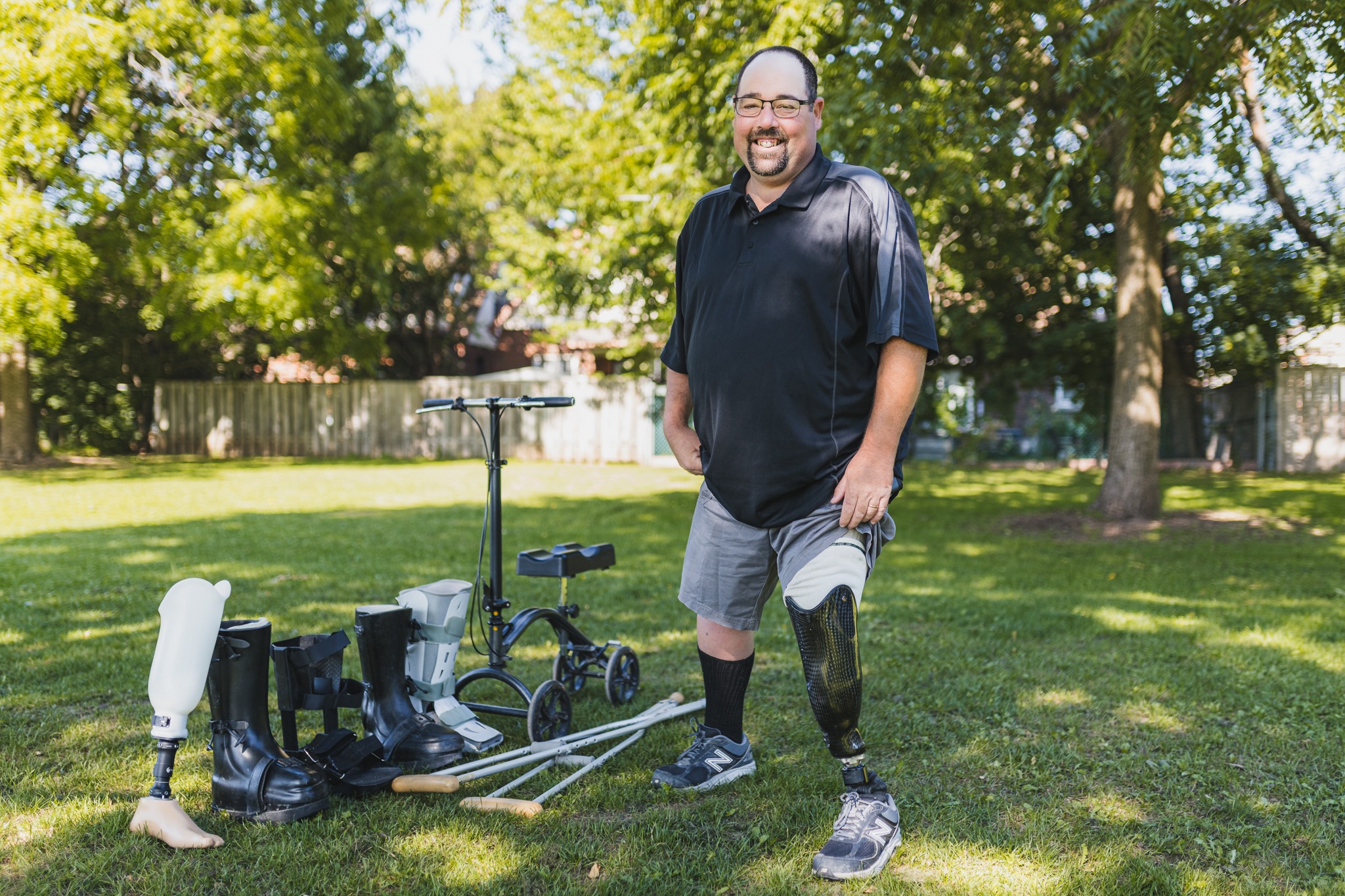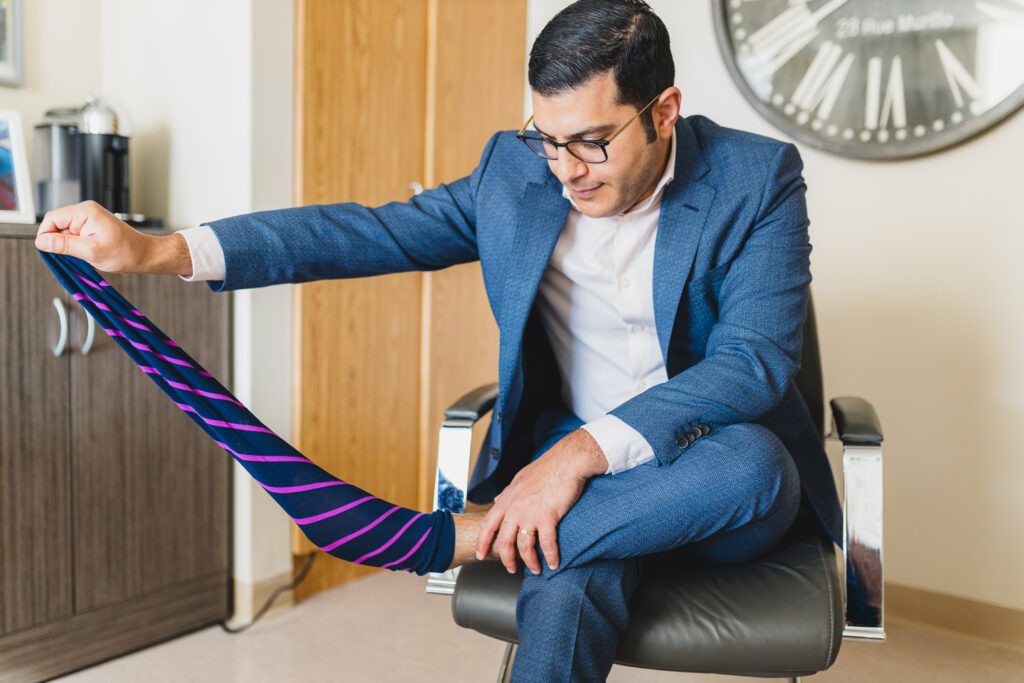
Stepping up to prevent foot amputations
Ontario has among the highest rates in the world for diabetes-related foot amputations, with lower Hamilton having the highest rates locally.
Hamilton Health Sciences (HHS) together with the Greater Hamilton Health Network (GHHN) is launching a Socks Off! campaign on July 17 which aims to reduce the number of lower Hamilton residents who lose a foot to amputation due to diabetes and/or vascular disease. The GHHN is the area’s Ontario Health Team (OHT), made up of health-care providers and organizations responsible for delivering coordinated patient care in Hamilton, Haldimand and parts of Niagara.
Aimed at family doctors and other health-care providers in lower Hamilton, the campaign encourages them to routinely check the bare feet of their patients with diabetes and vascular disease. Hence the campaign’s name, Socks Off!
Getting eyes on feet
A complication of diabetes and vascular disease is poor circulation, which can lead to serious problems from something as simple as a cut or crack in the skin.
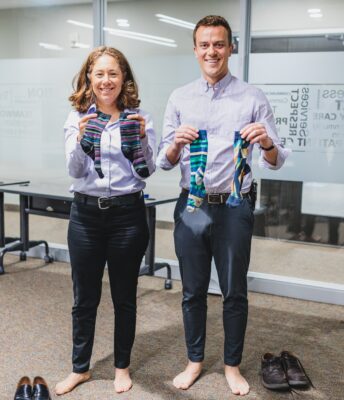
Dr. Tamar Packer and Dr. Brian McKenna are encouraging patients with diabetes and vascular disease to take their socks off for foot checks when visiting their family doctor or other health-care provider.
“Through the campaign, we’re encouraging primary care providers to routinely check these patients’ bare feet for cuts, blisters, cracks, callouses or other sores that could lead to a serious ulcer and amputation,” says Dr. Tamar Packer, chief of family medicine for complex continuing and post–acute care at HHS, and the GHHN’s clinical advisor for the hospital.
“Feet can’t be properly assessed if socks are on.” — Dr. Tamar Packer
Campaign materials include an implementation package for family doctors and health-care providers that streamlines the steps involved in seamlessly incorporating screening, early intervention, timely referral and patient education into their workday.
Other community partners in the campaign include paramedics, diabetes care programs, research programs, home and community services as well as some private wound, chiropody (foot care) and vascular clinics. The program also includes community outreach through the Shelter Health Network, Good Shepherd, the HRIC and Indwell.
Preventing up to 85 per cent of complications, including amputations
Socks Off! promotes the HHS/GHHN OHT Lower-Limb Preservation Integrated Care Program, which aims over time to reduce the amount of lower leg and foot amputations in the city through a more coordinated, integrated and patient-centred approach. This includes regular foot checks, early identification, timely assessment, best-practice treatment, ongoing monitoring, cardiovascular risk management, wound prevention strategies, and patient education. The program is receiving $600,000 in provincial funding over a year.
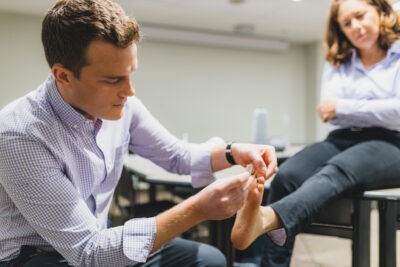
Dr. Brian McKenna and Dr. Tamar Packer demonstrate a foot check. It’s quick and easy to do, and can prevent serious complications including amputations.
“By routinely checking patients’ feet we can help prevent up to 85 per cent of amputations and other complications related to poor circulation,” says Packer, adding that people with diabetes may not be aware of foot injuries because they’ve lost feeling in their feet due to poor circulation.
“Simply asking our patients how their feet are doing isn’t enough. Feet can’t be properly assessed if socks are on.”
If left too long

Dr. Fadi Elias, vascular surgeon, Hamilton Health Sciences
Hamilton Health Sciences vascular surgeon Dr. Fadi Elias sees diabetic patients in the later stages of infection, when surgery is a last resort to try and avoid amputation.
“I hear their stories and I review the treatment pathways that eventually brought them to my office,” says Elias. “Unfortunately, there are often many points in their health-care journey where the disease’s progression could have been slowed down by early intervention that didn’t happen.”
“My goal, through this campaign, is to give primary care providers the tools they need to assess patients early and regularly to avoid needing vascular surgery or an amputation.” — Dr. Fadi Elias
Health equity
A key priority of the Socks Off! campaign is health equity and the need for all people to have a fair chance at achieving good health.
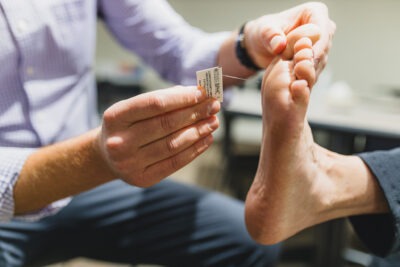
Diabetic foot screen test
“This campaign provides an opportunity to really impact inequities in Hamilton in terms of health and wellness, as well as to collaborate with some of the top partners in the city,” says Dr. Brian McKenna, a family doctor and deputy lead physician at the Hamilton Family Health Team, whose membership includes 165 family doctors, their practice teams, and 250 other health-care workers in the city.
“The Socks Off! campaign prioritizes health equity at its core,” says McKenna. “Through this campaign, we have an incredible opportunity to prevent horrific health outcomes for our most at-risk diabetic patients with poor circulation whom, statistically, living in lower Hamilton, are more likely to need an amputation than almost anywhere else in Ontario.”
Population health is a priority for HHS, says Leslie Gillies, vice president of community medicine and population health, interprofessional development/practice and clinical education for the hospital. “We’re excited to co-launch the Socks Off! campaign, which supports caring for our diabetic patients beyond our hospital walls.”
Melissa McCallum, executive director of the GHHN, adds, “This campaign has the potential to go a very long way in helping people with diabetes and/or vascular disease, avoid devastating, life-altering complications such as lower limb amputations.”
Patient education

Dr. Perry Mayer, medical director, The Mayer Institute
As part of the campaign, primary care providers are being encouraged to make their patients partners in care.
“There are three pieces of advice that primary care providers should give to their diabetic patients,” says Dr. Perry Mayer, medical director of The Mayer Institute in Hamilton, a centre of excellence in treating diabetic feet.
By following these three steps every day, 85 per cent of diabetic foot problems can be prevented, says Mayer:
Step 1 – Always wear shoes, even indoors. Shoes protect feet from wear-and-tear or cuts that could lead to infection or amputation. And shoes need to fit well so that they don’t rub against the skin, causing sores.
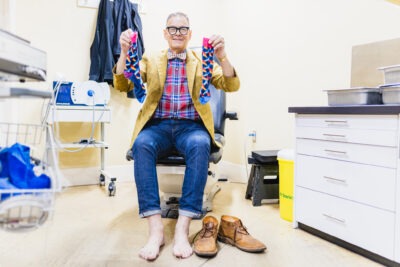
Patients can also play a vital role in preventing serious complications including amputations. Dr. Perry Mayer offers three steps to keep feet healthy.
Step 2 – Moisturize feet every day. “Moisturizing helps keep skin supple, so it’s less likely to crack or break,” says Mayer. “This helps prevent an ulcer from developing that could lead to a potential amputation.”
Step 3 – Check feet every day, including in between toes. “If you see any sign of a wound developing, you need to get off your feet right away and call your health-care provider for an appointment,” says Mayer, adding, “I can’t stress enough how important it is for people to get off their feet immediately. Unfortunately, if patients don’t offload right away and have their wound examined and cleaned by a health-care professional, nothing is going to work for them.”
And patients should take the initiative with their primary care provider by asking for a foot check at appointments, says Mayer. “As soon as you get into the examination room, take off your socks. It’s a reminder for the primary care provider to check your feet, and it saves time too.”

